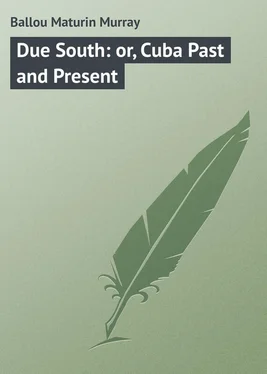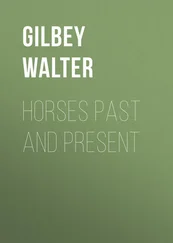Maturin Ballou - Due South - or, Cuba Past and Present
Здесь есть возможность читать онлайн «Maturin Ballou - Due South - or, Cuba Past and Present» — ознакомительный отрывок электронной книги совершенно бесплатно, а после прочтения отрывка купить полную версию. В некоторых случаях можно слушать аудио, скачать через торрент в формате fb2 и присутствует краткое содержание. ISBN: , Жанр: foreign_prose, на английском языке. Описание произведения, (предисловие) а так же отзывы посетителей доступны на портале библиотеки ЛибКат.
- Название:Due South: or, Cuba Past and Present
- Автор:
- Жанр:
- Год:неизвестен
- ISBN:http://www.gutenberg.org/ebooks/30130
- Рейтинг книги:4 / 5. Голосов: 1
-
Избранное:Добавить в избранное
- Отзывы:
-
Ваша оценка:
- 80
- 1
- 2
- 3
- 4
- 5
Due South: or, Cuba Past and Present: краткое содержание, описание и аннотация
Предлагаем к чтению аннотацию, описание, краткое содержание или предисловие (зависит от того, что написал сам автор книги «Due South: or, Cuba Past and Present»). Если вы не нашли необходимую информацию о книге — напишите в комментариях, мы постараемся отыскать её.
Due South: or, Cuba Past and Present — читать онлайн ознакомительный отрывок
Ниже представлен текст книги, разбитый по страницам. Система сохранения места последней прочитанной страницы, позволяет с удобством читать онлайн бесплатно книгу «Due South: or, Cuba Past and Present», без необходимости каждый раз заново искать на чём Вы остановились. Поставьте закладку, и сможете в любой момент перейти на страницу, на которой закончили чтение.
Интервал:
Закладка:
The Plaza of Cienfuegos forms a large, well-arranged square, where an out-door military concert is given twice a week, a universal practice in all Cuban cities. It is laid out with excellent taste, its broad paths nicely paved, and the whole lighted at night with numerous ornamental gas-lamps. The vegetation is both attractive and characteristic, consisting of palms, laurels, and flowering shrubs, mingled with which are some exotics from the North, which droop with a homesick aspect. Plants, like human beings, will pine for their native atmosphere. If it be more rigorous and less genial at the North, still there is a bracing, tonic effect, imparting life and strength, which is wanting in the low latitudes. On one side of this fine square is the government house and barracks, opposite to which is an open-air theatre, and in front is the cathedral with any number of discordant bells. The little English sparrow seems to be ubiquitous, and as pugnacious here as on Boston Common, or the Central Park of New York. Boyish games are very similar the world over: young Cuba was playing marbles after the orthodox fashion, knuckle-down. It was very pitiful to behold the army of beggars in so small a city, but begging is synonymous with the Spanish name, both in her European and colonial possessions. Here the maimed, halt, and blind meet one at every turn. Saturday is the harvest day for beggars in the Cuban cities, on which occasion they go about by scores from door to door, carrying a large canvas bag. Each family and shop is supplied with a quantity of small rolls of bread, specially baked for the purpose, and one of which is nearly always given to the applicant on that day, so the mendicant's bag becomes full of rolls. These, mixed with vegetables, bits of fish, and sometimes meat and bones when they can be procured, are boiled into a soup, thus keeping soul and body together in the poor creatures during the week.
Cienfuegos is situated in the midst of a sugar-producing district, where soil and climate are both favorable, and over twenty large plantations are to be seen within a radius of two or three leagues. The export from them, as we were informed by the courteous editor of "La Opinion," a local paper, aggregates thirty thousand hogsheads annually. The visitor should not fail to make an excursion to some representative plantation, where it is impossible not to be much interested and practically informed. One of these sugar estates, situated less than two leagues from the town, was found to be furnished with a complete outfit of the most modern machinery, which had cost the proprietor a quarter of a million dollars. It was working with the usual favorable results, though at the present price of sugar no profit can accrue to the planter. The plantation presented a busy scene. During the grinding season the machinery is run night and day, but is obliged to lie idle for eight months out of the year.
In the uncultivated fields through which we passed when driving out to the sugar estate, the prickly pear grew close to the ground in great luxuriance, as it is seen on our Western prairies. Its thick leaves, so green as to be dense with color, impart the effect of greensward at a short distance. On close inspection it was seen to be the star cactus, which like the Northern thistle kills all other vegetation within its reach. Here and there the wild ipecacuanha with its bright red blossom was observed, but the fields, except those devoted to the cane, were very barren near Cienfuegos.
Sugar-cane is cultivated like Indian corn, which it also resembles in appearance. It is first planted in rows, not in hills, and must be hoed and weeded until it gets high enough to shade its roots. Then it may be left to itself until it reaches maturity. This refers to the first laying out of a plantation, which will afterwards continue fruitful for years by very simple processes of renewal. When thoroughly ripe the cane is of a light golden yellow, streaked here and there with red. The top is dark green, with long narrow leaves depending, – very much like those of the corn stalk, – from the centre of which shoots upwards a silvery stem a couple of feet in height, and from its tip grows a white fringed plume, of a delicate lilac hue. The effect of a large field at its maturity, lying under a torrid sun and gently yielding to the breeze, is very fine, a picture to live in the memory ever after. In the competition between the products of beet-root sugar and that from sugar-cane, the former controls the market, because it can be produced at a cheaper rate, besides which its production is stimulated by nearly all of the European states through the means of liberal subsidies both to the farmer and to the manufacturer. Beet sugar, however, does not possess so high a percentage of true saccharine matter as does the product of the cane, the latter seeming to be nature's most direct mode of supplying us with the article. The Cuban planters have one advantage over all other sugar-cane producing countries, in the great and inexhaustible fertility of the soil of the island. For instance: one to two hogsheads of sugar to the acre is considered a good yield in Jamaica, but in Cuba three hogsheads is the average. Fertilizing of any sort is rarely employed in the cane-fields, while in beet farming it is the principal agent of success.
Though the modern machinery, as lately adopted on the plantations, is very expensive, still the result achieved by it is so much superior to that of the old methods of manufacture that the small planters are being driven from the market. Slave labor cannot compete with machinery. The low price of sugar renders economy imperative in all branches of the business, in order to leave a margin for profit. A planter informed the author that he should spread all of his molasses upon the cane-fields this year as a fertilizer, rather than send it to a distant market and receive only what it cost. He further said that thousands of acres of sugar-cane would be allowed to rot in the fields this season, as it would cost more to cut, grind, pack, and send it to market than could be realized for the manufactured article. Had the price of sugar remained this year at a figure which would afford the planters a fair profit, it might have been the means of tiding over the chasm of bankruptcy which has long stared them in the face, and upon the brink of which they now stand. But with a more than average crop, both as to quantity and quality, whether to gather it or not is a problem. Under these circumstances it is difficult to say what is to become, financially, of the people of Cuba. Sugar is their great staple, but all business has been equally depressed upon the island, under the bane of civil wars, extortionate taxation, and oppressive rule.
If you visit Cienfuegos you will take rooms at the Hotel Union, as being the least objectionable of the two public houses which the city contains, and there you will make the acquaintance of Jane, who is an institution in herself. Indeed, she will doubtless board your ship when it first arrives, so as to enlighten you concerning the excellences of the Union over its rival establishment, which will also be sure to be represented. Jane is interpreter and general factotum of that delectable posada, the Union, and being the only one in the house who speaks either French or English, she becomes an important factor in your calculations. Jane's nationality is a pleasing mystery, but she may be classed as a Portuguese quadroon. Venus did not preside at her birth, but, by means of the puff-ball and egg-shell powder, she strives to harmonize her mottled features. Being interpreter, waitress, hotel-runner, and chambermaid, she is no idler, and fully earns the quarter eagle you naturally hand her at leave-taking. In visiting the neighboring sugar plantation Jane acts as your guide, on which occasion her independence will be sure to challenge admiration. She salutes slave or master with equal familiarity, conducts you through each process of the elaborate works, from the engine to the crushing mill, and so on, until you reach the centrifugal machine, where the glistening crystals of pure sugar fall into an open receptacle ready for packing and shipment. She takes you into the slave-quarters among the pickaninnies, hens, pigs, and pigeons, looking on blandly and chewing huge pieces of cane while you distribute the bright ten cent pieces with which you filled your pocket at starting. If Jane slyly pinches a papoose and causes it to yell, it is only for fun; she means no harm, though the dusky mite gets smartly slapped by its mother for misbehaving. The cabin floor of bare earth is sure to be covered with these little naked, sprawling objects, like ants. On the way back to town Jane orders the postilion to drive into the private grounds of a palatial Cuban residence, where she boldly announces herself and party to the proprietor in good rolling Spanish. It is the home of Señor N – , a wealthy merchant of the city. We are received as though we belonged to the royal family. The hospitable owner speaks English fluently, and answers our thousand and one questions with tireless courtesy, takes us into his superb fruit garden (of which more anon), then introduces us to his domestic quarters, where everything appears refined, faultlessly neat, and tasteful. If you go to the railroad station, as usual the evening before departure, in order to secure tickets and get your baggage labeled, – for the cars start in the morning before daylight, – Jane will accompany you, riding by your side in the victoria. Excuse her if she orders the calash thrown back, as she appears bonnetless in a loud, theatrical costume, trimmed with red and yellow, and carrying a bouquet in her freckled hands. It is her opportunity, and she looks triumphantly at the street loungers in passing. If you are charged on your bill a Delmonico price for a mythical lunch to be taken with you on the journey to Matanzas, and which Jane has forgotten to put up, pay without wrangling; it saves time and temper.
Читать дальшеИнтервал:
Закладка:
Похожие книги на «Due South: or, Cuba Past and Present»
Представляем Вашему вниманию похожие книги на «Due South: or, Cuba Past and Present» списком для выбора. Мы отобрали схожую по названию и смыслу литературу в надежде предоставить читателям больше вариантов отыскать новые, интересные, ещё непрочитанные произведения.
Обсуждение, отзывы о книге «Due South: or, Cuba Past and Present» и просто собственные мнения читателей. Оставьте ваши комментарии, напишите, что Вы думаете о произведении, его смысле или главных героях. Укажите что конкретно понравилось, а что нет, и почему Вы так считаете.












